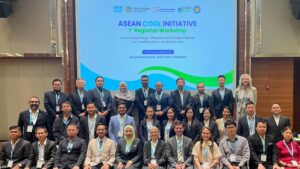
The ASEAN region is one of the fastest growing markets for cooling products in the world. The current market penetration of air conditioners is 15% and the market is expected to grow from the current 83 million units (in 2022) to nearly 243 million units by 2040. To address the impact this growth will have on climate and energy, the ASEAN Member States have adopted an updated roadmap for harmonization and implementation of MEPS for air conditioners in the region. However, a comprehensive strategy to transform the market to higher efficiency air conditioners using low-global warming potential (GWP) refrigerants is still needed.
This is where the ASEAN Cool Initiative comes in. Under the stewardship of UNEP-U4E, and funded by the Clean Cooling Collaborative (CCC), the initiative aims to accelerate the implementation of the roadmap by providing technical assistance and capacity building on MEPS and labels in the region. UNEP-U4E is partnering with ACE to implement the activities at the regional level, and other partners include Lawrence Berkeley National Laboratory (LBNL), GIZ and the International Institute for Energy Conservation (IIEC) to provide technical expertise to the project.
This first regional workshop served as a platform to build coordination and collaboration amongst member states to progress toward the regional MEPS for room air conditioners and to raise their awareness on the updated MEPS levels. It also facilitated the sharing of knowledge, feedback and experiences on past and current cooling initiatives and projects in the region and globally, in particular focussing on closer cooperation between ASEAN and countries such as China and Japan.
Day 1 was rounded off with presentations sharing experiences of air conditioner MEPS in China, Japan and Southern Africa, and the perspectives of international organizations CCC, CLASP, GIZ and SEforALL on their initiatives for higher MEPS for air conditioners.
It was noted that the adoption of Phase I levels (3.7 CSPF) with a target date of 2023 in line with the regional policy roadmap was hampered by the pandemic. UNEP-U4E highlighted the potential savings attributed to directly leapfrogging to MEPS Phase II levels (6.09 CSPF) as per the regional policy roadmap. It was emphasized that about 268 TWh could be saved across the region in 2040, resulting in 209 MtCO2e carbon abatement and up to $32 billion in electricity bill savings for consumers.
On Day 2, after introductory presentations on manufacturer needs and current capacity for energy-efficient and low-global warming potential air conditioners, an animated open discussion explored the challenges and barriers in implementing air conditioner MEPS and the support needed to adopt more stringent levels. Some of the key takeaways from the two-day workshop are summarized below:
- There is a need to regulate products sold on e-commerce and ensure increased awareness among e-commerce companies (via Ministries of Information and Technology) to communicate the benefits of energy efficiency to consumers.
- The local industry should be provided with current market data on the cost of inverter units and affordable designs via support from the ASEAN Cool Initiative to prevent AMS from becoming a dumping ground for less efficient air conditioners.
- Harmonizing labels is crucial in facilitating informed purchasing decisions for consumers, as imported products are affixed with labels from the country of origin, which often confuse rather than guide consumers.
- Institute inter-ministerial collaboration (Energy-Environment, etc.) to regulate harmonized GWP limits (refrigerant use). This would also help leverage forthcoming opportunities under the Montreal Protocol, Twinning Capacity building, and the Multilateral Fund on energy efficiency and refrigerants.
- Consumer campaigns should emphasize the life cycle costs of RACs while highlighting the availability of several highly energy-efficient products at comparable costs. There are opportunities to engage retailers and salespeople to communicate these benefits.
- A robust regulatory framework for monitoring and verification activities is the prime reason for the success of several government programs on MEPS adoption.
For more information on the workshop or the ASEAN Cool Initiative, contact Patrick Blake (Patrick.blake@un.org) and Saikiran Kasamsetty (saikiran.kasamsetty@un.org).